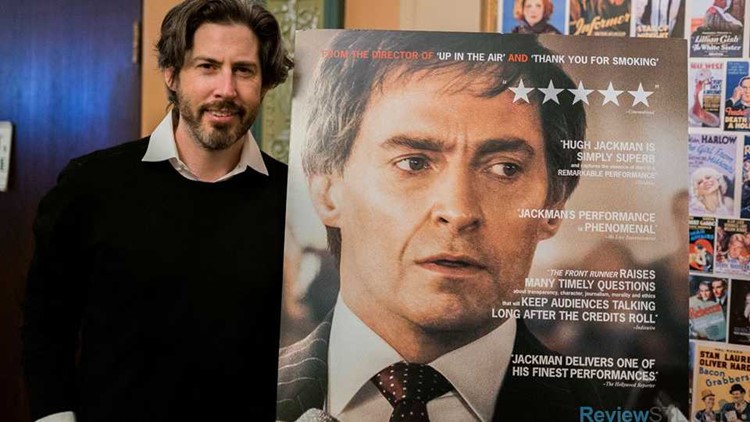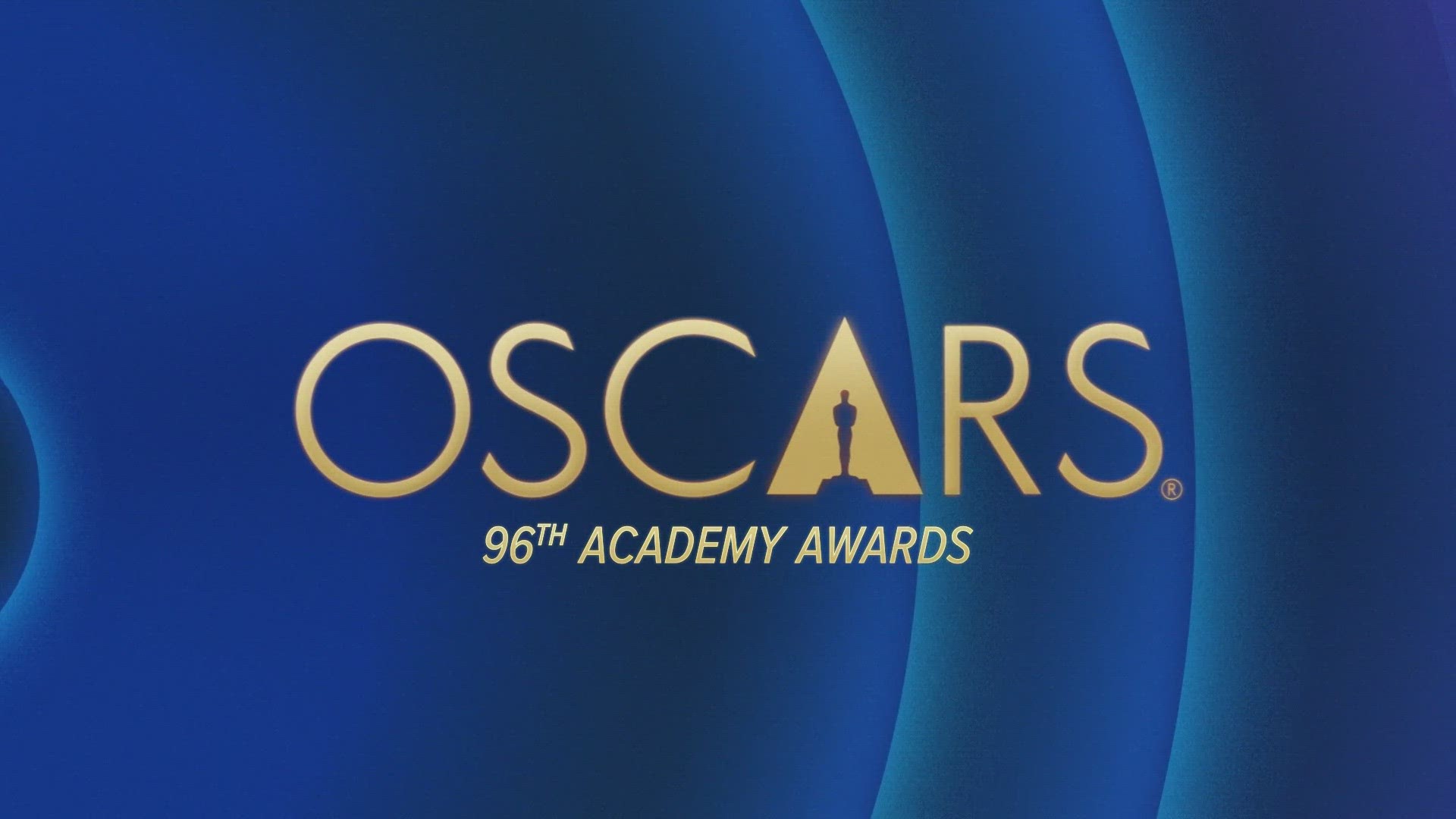ST. LOUIS — It's been 30 years since Gary Hart was a sure-fire presidential candidate one week, and out of the race completely less than two weeks later with the future of politics changed for good. But no one in Hollywood has touched his story... until Jason Reitman came along.
The Front Runner opens in St. Louis this week, and it stars Hugh Jackman as the titular and infamous senator out of Colorado who had the world as his oyster before a humanistic flaw brought it all down. It was those imperfections that drew the filmmaker to Hart, because Reitman likes spending time with complicated people.
Back in St. Louis at The Cheshire--the very place he filmed part of 2009's Up In The Air with George Clooney--Reitman took some time to speak with a roundtable of film critics, including myself, about his new film and why he felt it had to be made. But first, he couldn't help but admit the building--and city for that matter--brought back a lot of great memories from nearly a decade ago.
"I love flying into St. Louis, because it brings back this flooding of memories from shooting Up In the Air. From the moment I step off the plane, I always wind up walking out of a gate that we literally just filmed right by," Reitman said. "I see the Hilton we shot at. The parking spot where Hertz was. I drive around and there’s the apartment building where George lived."
The nostalgia hasn't worn off on Reitman with regards to St. Louis, and neither has making independent films. The Front Runner marks his second independently financed film this year after Tully, and its subject isn't an easy person to love, which is how Reitman likes his characters.
"I don't believe in heroes or villains. For this kind of movie, about real life, you don't have heroes or villains. They are more complicated than that," Reitman told Kevin Brackett of ReviewSTL.com. "Gary Hart is more complicated than that. He was this very interesting litmus test for how we view flaws in our leaders. He was this handsome, charming, Kennedy-esque candidate-but he also was a human being who made human mistakes, and they were private ones."
The crutch of the film hinges on Hart's alleged affair with a woman while in the final weeks of his campaign, and his battle cry centered on a need to have a private and public life, both separate from one another. The press, powered by the then small-time Miami Herald, investigated Hart, and ended up erasing the line between private and public.
In order to properly tell Hart's story, you needed an actor capable of filling not only the shoes and looks of the man, but the tarnished persona as well. When I asked Reitman if Jackman was his only choice, the writer/director didn't hesitate. "Yeah. Beyond the cosmetic similarities between Hugh and Gary, he's an actor I have been wanting to work with for a long time," Reitman said. "It could have been these last five years. He's taken it up a notch. I thought Logan was an exceptional performance to take a character over the course of nine movies and stick the landing with such an emotional closing film."
It went beyond the acting though in Reitman choosing Jackman; the diligence of the actor was also hard to deny. "I was familiar with his decency and his work ethic, and those all came true. It's not an easy role. The first thing you need to learn as an actor is to know the character's goals and their choices. Here was a character where you were never going to understand that, and it became his job to protect those ideas. He let the audience peek in, but never actually walk in the door. It's a tricky thing to do, to not judge your character."
Reitman doesn't beat you over the head with his personal opinion on Hart and his actions, instead stepping back and letting Matt Bai's book clash with the actors in the ring. Reitman, along with Jay Carson and Bai, doesn't allow his politics to get into the middle of Hart's story and the audience.
When it came to showing the film to Hart, Reitman was terrified. "Imagine me making a movie about your life. Let me pick the worst week," Reitman recalled about the process of flying around the country and showing the film to the real people the film is based on. "In the end, I think they felt the empathy of the actors and myself, treating it as seriously as we did."
Reitman was also drawn to the way that the public's curiosity works in complicated ways. He noted how people remember what they want with Hart's story, and that's how they do with most things in the news cycle. "We take this moment, which is a groundbreaking moment between the relationship of celebrification and politics, and instead of thinking about what changed in that moment, we think of it as the name of a boat," Reitman said. "We follow politics like a soap opera."
When asked by Tony Mosello of The Flick Fanatic why it was time to make the film, Reitman said the script was written in 2015, before the Presidential Election. "The relevance was obvious, so it needed a light touch. As a filmmaker, you have to be aware of the value that it brings to the audience. It kept on evolving. It evolves today."
One of the things that really struck me about the film was the lighter touch Reitman was able to play to such a tragic and game-changing story, and the flow he brought to the story. A large part of the film takes place inside the campaign office and rooms with Hart's staff, and it's an effortless thing. Reitman broke down how he achieved that feel. "It starts in the screenplay. We need to make the audience answer that question," Reitman said.
"We wanted to have three overlapping conversations in every scene. You pick the conversation to listen to. Everyone was wired. Our sound mixer, Steve Morrow, mic'd everyone up and all mics were on in every shot," he added. "In a process that was usually done in post, he was doing on the fly, using his mixer like a piano, balancing the conversations."
An educated cast helped the flow as well, because Reitman assembled a Master Dean's List of thespians for the film. "We had two Princeton grads, two Harvard grads, a Yale grad, and an Oxford grad. We had a stupidly educated cast. I was intimidated," Reitman said.
Reitman noted the experience of working with his director of photography, Eric Steelberg, as a reason for the feel of the film working so well and the background actors playing small yet vital parts. In order for a symphony to truly work, each part must be committed and in sync. On The Front Runner, everyone was. Technically, the film is flawless.
Then again, without the central pathos, the technical achievements can fall flat, like a spice rack without a piece of protein. Reitman's fascination with complicated people was the secret sauce for this film's execution. "These are the kind of people I want to spend time with. I like complicated people, how exposed their flaws are," Reitman said. "From the moment I read the book, Thank You For Smoking, I knew I wanted to spend time with Nick Naylor. I didn't want to spend time with the guy from the Lung Association."
Gary Hart was someone Reitman wanted to spend time with, and once he found the right leading man and the right time to tell this story, the stage was set for a movie. Complicated people are always going to be interesting ones with twisted pasts and unknown decision-making skills, and that's firewood for Hollywood's biggest bonfire. Reitman takes perfect-looking people and shows us their flaws, what makes them tick and eventually, stick their feet in the ground.
The Front Runner doesn't pick a side in the end, because the best way to tell a story is to point the camera at a complicated person and just watch their life for a week.



